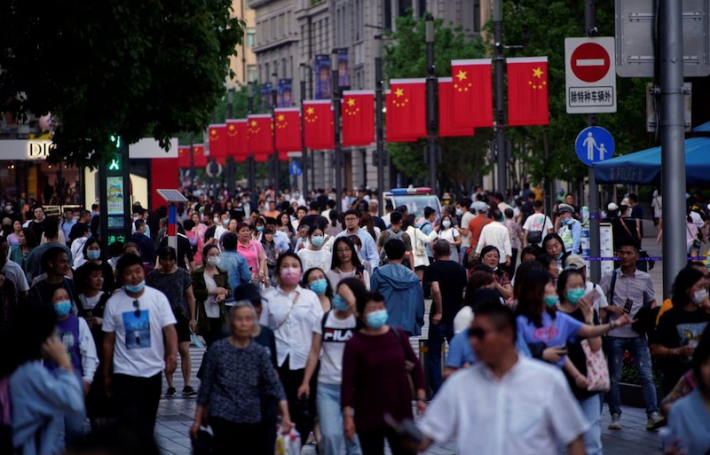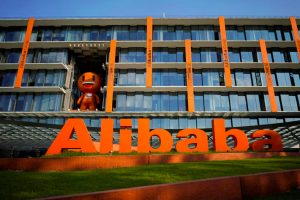Investors are loading up bullish bets on China as the latest data pointing to the world’s second-largest economy struggling to recover has shored up hopes of greater stimulus.
“For China, it is ‘bad news is good news’ at the moment,” Jun Bei Liu, portfolio manager at Tribeca Investment Partners in Sydney said.
“I think the reopening trade remains intact, though slower than before. China is not an ‘avoid’. [A] recovery is coming, albeit taking longer,” Liu added.
Also on AF: China Sees the Dawn of a New Era of Slower Growth
Liu expects to see increased stimulus targeting cyclical sectors, such as housing, and is more interested in the services sector in the belief that post-pandemic demand will eventually rise.
Data this week showed the Chinese economy is struggling for momentum in the second quarter with a post-Covid recovery quickly faltering.
Exports have declined due to cooling demand abroad and a prolonged property market downturn, showcased most recently by Evergrande’s $81 billion losses, has further sapped confidence.
‘China is a trade’
The grim readings have raised the spectre of China missing its modest 5% growth target for 2023, and spurred hopes of stronger stimulus measures after the upcoming July Politburo meeting of top Chinese officials.
Goldman Sachs analysts led by Kinger Lau believe a ‘tactical market recovery’ thesis is compelling.
“In fact, ‘China is a trade’ was a dominant theme in the majority of our meetings across investor types, regardless of their level of cautiousness and pessimism on the long-term growth and geopolitical outlooks,” the bank’s analysts said in a note.
They project a 15% 12-month return for the CSI300, which is now down 0.5% for the year, in stark contrast to the 16% rise in world stocks.
Data shocks priced in
Even before the latest disappointing growth data, a slew of soft economic indicators had shown China’s recovery was falling short, slamming the brakes on nascent stock market rallies.
Foreign money has been leaving, with worries over China’s cyber-security crackdowns and Sino-US flaps over chips and rare metals adding to growth concerns.
Foreign investors sold 2.7 billion yuan ($374.47 million) of Chinese shares in the second quarter, many making an exit after having pumped in a historical 186 billion yuan a quarter before.
The promise of big-bang stimulus, which has hitherto been a stop-go mix of one rate cut and some loan relaxations for the property and state sectors, is now drawing some investors in.
“The weak growth prospects and lack of policy stimulus have already been fully priced in, and any marginal improvement in growth and policy conditions should trigger a turnaround in market sentiment,” said Marcella Chow, global market strategist at JP Morgan Asset Management.
“In the near term, cyclical sectors, such as consumer discretionary, materials and property, may be the major beneficiaries.”
Hawk-eye on Politburo meeting
JPMorgan cut China’s 2023 growth forecast to 5% from 5.5%, while forecasting a deeper contraction of 20% this year in new construction.
The bank says possible steps the government could take to boost economic growth include another policy rate cut and nationwide housing policy easing, including a relaxation of down-payment requirements.
“Everyone is looking for a big bang Politburo meeting at the end of July, it’s a bit like Fed watching,” said Mike Kelly, head of multi-asset at PineBridge Investments.
But the strength of the policy package is expected to be constrained and targeted, according to some analysts, citing growing debt risks and officials’ recent speeches.
Not everyone betting on stimulus
“We are conservative about the extent of the policy support down the road,” said Alicia Garcia Herrero, chief economist, Asia Pacific at Natixis. “Fiscal policies may not be easily implemented, given the already high public debt and the reduced efficiency of these policies.”
Eugenia Victorino, head of Asia strategy at SEB, also reckons Beijing’s emphasis on patience will mean fresh support will be targeted, but is hopeful that recent policy support measures such as June’s rate cuts will begin to make themselves felt in coming months.
Beijing’s recent comments on doing more to support private enterprises, and the apparent end of a years-long regulatory crackdown on the tech sector could also be supportive factors for markets, Victorino added.
But Nomura analysts led by Ting Lu say the stimulus “may not turn things around, due to weak confidence, negative sentiment.”
“We believe markets should curb their expectations for a fast, cure-all package and instead embrace expectations of a growth slowdown to below 4.0% in 2024,” they wrote.
- Reuters, with additional editing by Vishakha Saxena
Also read:
China’s Luxury Sector Starting to Hit Some Headwinds
China’s Weak 2nd Quarter Growth Shows Need for Support
Beijing’s Crackdown Wiped $1.1 Trillion Off Chinese Big Tech
CITIC’s Hong Kong Bankers Face Shift to Mainland, Pay Cut
China’s Property Sector Will Remain Weak For Years: Goldman Sachs
Huge Debts Limiting Services in Some Chinese Cities – CNN
























